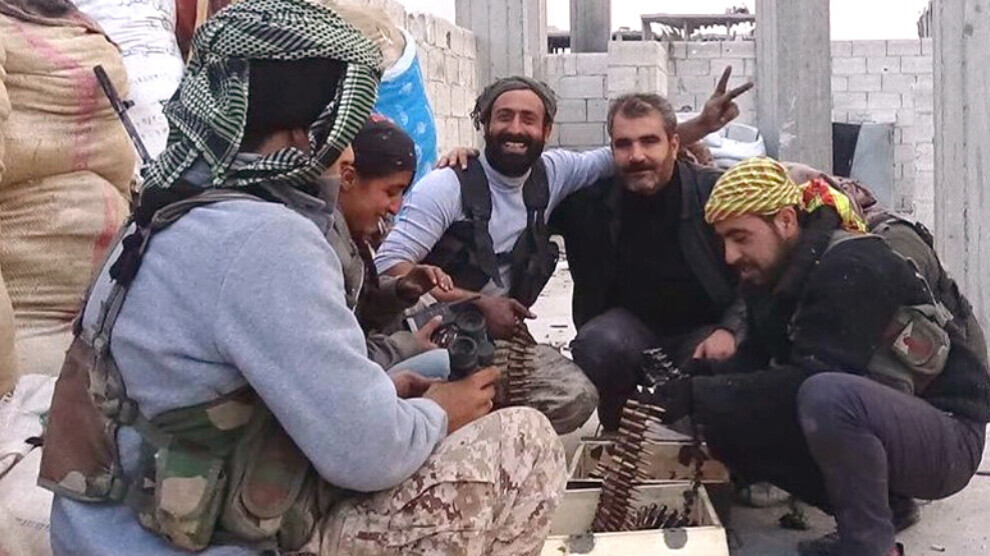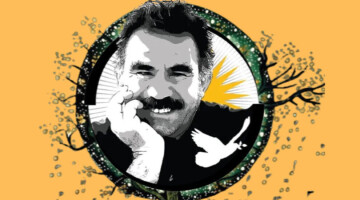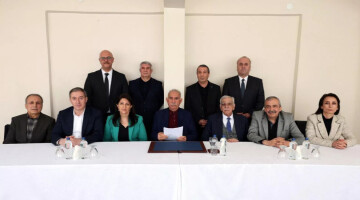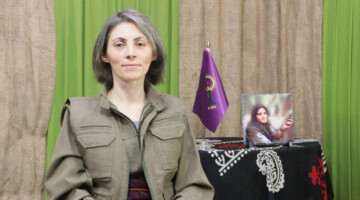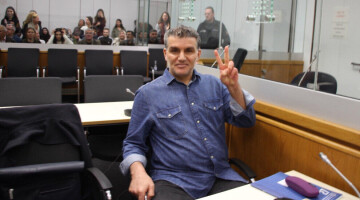Turkish president Recep Tayyip Erdoğan is planning another war of aggression against northern Syria. The Turkish head of regime named the cities of Manbij and Tel Rifat as the first targets for a possible invasion. With the capture of these places, Turkey wants to take a "further step" towards establishing a 30-kilometer-wide "security zone" along its southern border. After that, other regions should also be included “step by step”. Since 2016, Turkey has violated international law three times against the self-governing areas in northern Syria, which are mostly inhabited by Kurds. In the course of these invasions, large parts of the border strip were already occupied.
The town of Manbij is located about 30 kilometers south of the Turkish border and occupies a key strategic position in Turkey's plans to expand the illegal occupation zone. The region lies on the important M4 motorway, which runs through northern Syria like a lifeline and was already a strategic supply route for the terrorist group Islamic State. Manbij is defended by a military council belonging to the member organizations of the Syrian Democratic Forces (SDF). Şerwan Derwîş is one of the commanders of the Manbij Military Council and its spokesman. In this ANF interview, he commented on the strategic importance of the region and Turkey's threats of invasion.
Mr Derwîş, you were already in Manbij when ISIS ruled there. What happened in the city from the start of the Syrian civil war to the liberation of the city?
The regime was driven out of the city by armed groups on 19 July 2012. Among them was the Kurdish Front, which was under the command of Abu Leyla. At that time there were about 88 armed groups fighting against the regime in Manbij. These had nothing to do with the "Free Syrian Army". Nevertheless, the suffering of the population continued. Many of these groups committed crimes such as murder, kidnapping, and robbery, as well as fighting among themselves. This circumstance did not allow the city to recover after liberation from the regime.
Although most of the armed groups active in Manbij had ties to Turkey, there were no attacks on Kurds or Jabhat al-Akrad at the time, such as those seen in July 2013 in places like Til Eran and Til Hasil, Azaz, Girê Spî, Raqqa, al-Bab and Jarablus had given. That's because of the history of the city. In Manbij there have never been problems between the different population groups, racism had no ground. Elsewhere, there were dead and injured everywhere, and many Kurds were driven out by militias loyal to Turkey. None of this happened in Manbij.
The Kurds in Manbij were organized. For example, the first People's House of Rojava was opened in this city. A defense force was also established. Relations between the Kurds of Manbij and other peoples, as well as the Arab tribes, were strong. Therefore, at that time, it was not possible for the armed groups and the ISIS, which was gradually invading the region, to attack the Kurds in Manbij.
The ISIS came to Manbij between 2012 and 2013 - as the Al-Nusra Front, which the "Islamic State in Iraq" had co-founded. It benefited from competition among the armed groups in Manbij, which initially showed no stance towards ISIS. ISIS supported some FSA factions to establish themselves in the city. Later these mercenaries were killed, some of them were executed in public places by ISIS. On 21 January 2014, ISIS expelled all other groups from the city and occupied Manbij.
"The resistance against ISIS founded the military council of Manbij"
More than three thousand jihadists, who are now planning to attack together with the Turkish state, moved to Turkey via Kobanê at the time. But the armed force led by Abu Leyla did not leave the region. The group stayed in Qereqozax and fought ISIS. Some of the FSA groups that withdrew from Manbij and people with ties to the region did not go to Turkey. They stayed with Abu Leyla and fought ISIS together. Together with the YPG, these groups created the operations center “Burkan al-Furat” (Euphrates Volcano). The Shams al-Shamal group, then commanded by Abu Leyla, also joined Burkan al-Furat and fought alongside the YPG in Kobanê.
These people, who had to leave Manbij because of ISIS but stayed in the region and fought ISIS in Qereqozax, Kobanê and Tişrîn, formed the origin of the Manbij Military Council. After the liberation of Tişrîn, they founded our association and are still members of our council today.
Everyone knows that Manbij was under ISIS occupation from January 2014 to August 2016. The ISIS committed great atrocities in Manbij, slaughtered thousands of people. There are many people who have been arrested during this time and have continued to disappear. Their fate is still unknown.
You were there when the Turkish state and its soldiers moved the burial site of Suleiman Shah in northern Syria on 22 February 2015. What can you tell about it?
It is well known that while ISIS occupied Manbij, the Turkish state made no move to remove its soldiers or the mausoleum from the region. Only when we had repulsed the ISIS attack on Kobanê and were approaching Qereqozax did the Turkish state take action. At that time, we were advancing towards Qereqozax, the area was still under ISIS control.
At that time, the Turkish state negotiated with the YPG and agreed to cooperate in order to bring its soldiers and the mausoleum from Qereqozax to the village of Aşmê. The convoy of the Turkish army entered the region with tanks and soldiers via Kobanê. Then the grave was dismantled and taken along with the soldiers.
This incident is the most important proof that the Turkish state does not see ISIS as a threat. When ISIS ruled, the Turkish state had neither withdrawn its soldiers nor dismantled the grave. As the Manbij Military Council, we had no part in this agreement. It was an agreement between the YPG and Turkey, but we witnessed the developments at the time.
Apparently, the Turkish state began attacks immediately after the liberation of Manbij. What was the extent of the attacks and what impact did they have on Manbij?
Six years ago today we fought against ISIS around the city of Manbij and in some quarters of the city. But the Turkish state's attacks and threats against our city have never stopped since the Day of Liberation from Terror. Shortly after the liberation of Manbij, we were attacked by the Turkish state and its mercenaries in the village of Arimah. At that time, the Turkish state also used fighter jets. Since then, the howitzer shelling of Manbij has continued, and infiltration attempts have also occurred again and again. The Turkish state constantly threatened an invasion of Manbij. In other words, since the day the city was liberated, the noise of war at the front has never stopped, even if it varies in intensity from time to time.
With the liberation of Manbij, the Turkish state began constantly shelling the town and surrounding villages, deploying drones at the front and carrying out bomb attacks with the help of ISIS sleeper cells. It was about creating fear in the population, destabilising the region and expelling the people. The aim was to create chaos to prevent the reconstruction of the social system in Manbij after the war and the development of trade. These attacks were organized from Bab and Jarablus.
In addition, conflicts should be created between the Kurds, Turkmens, Arabs and Circassians. But these measures were unsuccessful. The people of Manbij continued to strengthen their unity and solidarity. After the liberation of the city, they rebuilt their self-government and economy.
It has been six years since the liberation of Manbij. When we started our liberation operation, we promised that we would make Manbij a model city among the areas liberated from ISIS. Despite all the attacks by the Turkish state and its mercenaries since then, this promise has been kept to a large extent. The people of Manbij established their own self-government, service and economic system, and constantly improved it. As the military council of Manbij, we have been developing the city's defense forces and defense system for six years. Here, too, we have reached an important level.

